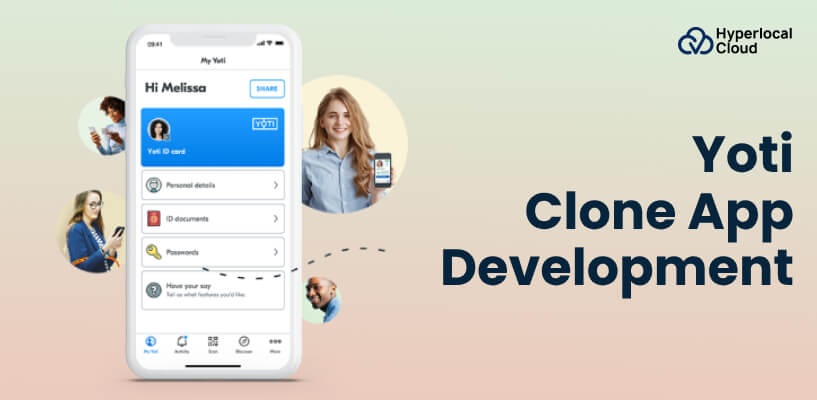Yoti Clone : Create A Digital Identity Verification App Like Yoti

Today, online identity verification has become one of the most vital and essential requirements for both users and businesses. With the increasing online frauds about data privacy, digital wallets, and eKYCs, the industry is shifting towards secure and reliable digital ID apps like Yoti. It doesn’t matter whether you are signing up for a service, confirming your age, or verifying identity details onboarding; the app provides a comprehensive solution.
If you are the business owner who wishes to create a digital identity verification app like Yoti, then this blog is for you.
What is Yoti Clone app?
Yoti is a smart digital ID app founded in 2014. It was especially built to securely save businesses’ and users ‘ personal details and third-party credentials. It helps companies and the government offer fast and secure ID verification services to users.
A Yoti clone app is an app solution that mimics the core functionalities of the original Yoti app. However, it provides them with the additional advantage of deep customization. Entrepreneurs can modify the logo, theme, features, and typography to match their brand niche.
Start building your Yoti clone today
How Does the Yoti App Work?
The working process of a Yoti clone app is designed to offer both ease of use and data security. The steps below explain how it works:
1. User Registration
At first, users sign up using their mobile number or email address. A secure PIN or biometric is set for future access.
2. Document Upload
Users upload documents such as passports, driver’s licenses, or national ID cards. These are scanned and stored securely.
3. Face Scan Verification
To ensure the user is the rightful owner of the documents, the app asks for a face scan using the mobile camera.
4. Secure Data Encryption
All user data is encrypted and stored either on the cloud or in the device using decentralized storage.
5. Identity Sharing
When a service requests user verification, the app allows the user to share selected information only, ensuring privacy.
6. eSignatures
Next, the app allows users to use the app to sign digital documents using their verified identity.
7. Verification for Third Parties
Also, the business owners are allowed to integrate the app to verify user identities during the sign in or registration processes.
What are the Core Features Offered by Yoti Clone App?
An efficient Yoti clone app offers intuitive features for both the admin and the user to simplify their tasks and enhance operational efficiency.
User Panel
1. User Registration and Login
It allows users to sign up and log in using email or phone with OTP or PIN.
2. Document Upload
It enables users to upload identity documents like ID cards, passports, or licenses.
3. Face Recognition
The Yoti clone app verifies the user’s identity by matching the document with a live facial scan.
4. Biometric Access
The clone app includes biometric features that enable users to add fingerprint or facial unlock for better security.
5. Profile Management
It also allows the user to edit, update, or delete their details and documents.
6. Identity Sharing
The Yoti clone enables the user to share identity credentials with third parties securely, with user consent.
7. eSignature Integration
The application allows the signing of digital documents using verified credentials.
8. QR Code Scanner
Our Yoti clone applications provide a QR scanner feature that ensures fast check-in or access using scannable identity codes.
9. Notification Alerts
The app uses push notifications to send reminders and updates about verifications or data access.
10. Data Encryption and Control
Our Yoti clone app ensures that all users can fully control what data is shared and with whom.
Admin Panel Features
1. Dashboard Overview
The Yoti clone app provides a centralized dashboard that allows displaying statistics, recent verifications, and system performance.
2. User Management
It allows the admin to manage user accounts and resolve verification issues.
3. Document Approval System
The clone app enables the admins to view, verify, or reject documents uploaded by users.
4. KYC Verification Management
The Yoti clone app also provides certain tools to conduct manual or automated KYC verification.
5. Data Analytics
In this feature, the Yoti clone app tracks user activity, performance metrics, and trends, helping the admin to make informed decisions.
6. Notification Control
The app enables the admin to access the notifications, manage alerts sent to users and partners.
7. API Integration Manager
The admin can integrate with third-party apps, websites, or business tools.
8. Compliance Management
The Yoti clone app development helps the admin to maintain data regulations like GDPR or local laws.
9. Role-Based Access
The admin can assign roles to internal team members for better access control.
10. Backup and Restore
The Yoti clone app has automatic data backup and system restore in case of any failure.
Ready to build your own digital ID app?
Reasons Why Businesses Want to Develop a Yoti Clone App
These are a few reasons why businesses want to access the Yoti clone app.
Reduces Frauds
An efficient Yoti clone app identifies users’ and customers’ identity and age verification. This prevents access to unauthorized users and reduces the chances of fraud.
Streamline Onboarding
Yoti clone app’s robust features ensure that only authorized users can access the details, reducing friction and resulting in a smooth onboarding process.
Ensures Compliance
The clone app ensures that it ensures compliance with all the essential regulations like GDPR, etc, to avoid legal complications.
What are the Advanced Features Added in the Yoti Clone App?
We integrate advanced technologies to enhance the user experience, app scalability, and better control. Check out the pointers below once!
Blockchain Technology for Identity Verification
We incorporate blockchain technology to add an extra layer of security by storing identity credentials in decentralized blocks.
AI Integration for Document Scanning
Yoti clone app development also includes artificial intelligence to scan documents for authenticity in real time.
Liveness Detection
Create a digital identity verification app that prevents spoofing by checking whether the face is live or a photo/video.
Multi-Language Support
Our Yoti clone app supports multiple languages so users can access the app in their preferred language.
Geo-Location Tagging
Next, we include a geo-location tagging feature that adds location information to verifications for added security.
Offline Document Verification
The Yoti clone app scans and verifies even when offline; syncs when the internet is restored.
Regular Audit Trails
The clone app creates regular audits and provides a track to the admin for more transparency.
Digital Wallet Integration
Create a digital identity verification app and connect payment systems or digital wallets for services like age-verified payments.
Smart Contract Integration
The clone app enables automatic actions like granting access upon verification, which helps enhance operational efficiency.
Cloud Backup & Recovery
Last, we utilize robust maintenance to encrypt cloud backups for safety against data loss.
What Steps are Required to Create a Digital Identity Verification App?
Yoti clone app development is a process that requires attention to detail, precise strategies and a meticulous approach. Here is a step-by-step explanation of building Yoti clone app.
Market and Competitor Research
First, it’s vital to understand the current market demands. Analyzing different user behaviour helps understand their expectations and build a strategic business growth approach.
Requirement Gathering
Next, identify the target audience’s behaviour, the app’s core functionalities, and deployment platforms to simplify the further processes.
Wireframing and UI/UX Design
In the third step, designers work to build sketches of the design screens and focus on offering a smooth navigation interface for users.
Choosing the Tech Stack
Here, the development team selects the robust tech stack with highly efficient programming languages, frameworks, APIs, and hosting services.
Frontend and Backend Development
In this step, developers work on the backend side by setting up APIs, frameworks, and databases to build a robust and reliable Yoti clone app.
Integration of Key Features
Now, developers add the necessary or required core features like identity verification, document scanning, face detection, and admin controls.
Testing and Debugging
Once all the customization is done, the Q&A team tests it properly to ensure its usability, functionality, and scalability while ensuring all the required compliances.
Deployment
Once all the testing is completed, the team launches the app on iOS, Android, and web platforms.
Post-Launch Support
After deploying the platform, the development team offers you technical support, updates, and system monitoring.
Want to create the next-gen ID verification platform?
What Tech Stack is Followed to Build the Yoti Clone App?
A solid technology stack ensures that the app is fast, reliable, and secure. Below is a simple tech stack that developers can use for building a Yoti clone app.
| Type | Technology Used |
| Frontend | Flutter / React Native / Kotlin / Swift |
| Backend | Node.js / Python / Ruby on Rails |
| Database | PostgreSQL / MongoDB |
| Cloud Hosting | AWS / Google Cloud / Azure |
| Face Recognition | OpenCV / Amazon Rekognition / TrueFace |
| Document Scanning | SmartOCR / Google Vision AI |
| Encryption | AES 256 / RSA |
| Blockchain Integration | Ethereum / Hyperledger Fabric |
| Authentication | OAuth 2.0 / Firebase Authentication |
| APIs | RESTful APIs / GraphQL |
Still, the selection of other technologies may vary according to the project requirements and budget constraints.
What Factors Affect the Development Cost of the Yoti Clone?
The estimated cost of developing a Yoti clone app starts from 7,000. However, the final cost of building a Yoti clone app depends on several key factors:
App Complexity
Basic apps with limited features cost less, while advanced features like blockchain and AI raise the cost.
Design Requirements
A highly customized UI/UX can increase the design time and overall development cost of the Yoti clone app.
Platform Choice
Developing for both Android and iOS is more costly than building for one platform.
Team Size and Experience
Choose a professional on-demand mobile app development company, like Hyperlocal Cloud, with an experienced team of developers. Although they charge more, the results are worth it.
Integrating third-party APIs
Integrating third-party APIs for face recognition or document verification may require additional licensing fees.
Security Measures
Next is implementing advanced encryption, authentication, and compliance tools that enhance the security measures but also add to the cost.
Maintenance Services
A professional development team offers post-deployment services, such as regular updates, bug fixing, and monitoring, which are also part of ongoing costs.
What are the Monetisation Reasons for Developing a Yoti Clone App?
Below are the ways to earn good revenue from the Yoti clone app.
Freemium Model
The admin can offer basic features for free while charging for the more advanced features.
Subscription Plans
The admin can create different subscription plans, including basic, standard, and advanced, with various features. Users can pay a significant amount to access these plans.
In-App Advertisement
The admin can collaborate with third-party businesses and charge fees from them by displaying their ads within the app.
Partner With Hyperlocal Cloud for Yoti Clone App Development
Hyperlocal Cloud Inc. is a top-tier on-demand mobile app development company. We have a proven record of offering highly scalable, efficient, and feature-rich solutions. Our dedicated team of developers, designers, and testers works deliberately to give our clients the best solutions that help in their business growth. The following are the compelling reasons why various businesses are choosing Hyperlocal Cloud Inc.
- Experienced Team
- 100% Transparency
- Secure Solutions
- Proven Success Records
- Robust Technical Support





